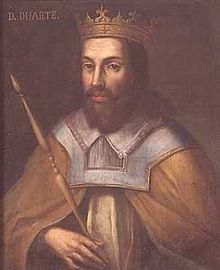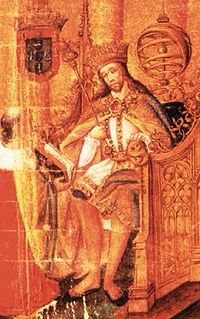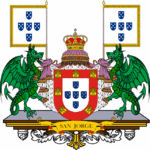- Edward of Portugal
-
Edward 
15th century painting of Edward King of Portugal and the Algarve Reign 14 August 1433—9 September 1438 (5 years, 26 days) Predecessor John I Successor Afonso V Spouse Eleanor of Aragon Issue Afonso V of Portugal
Infante Ferdinand, Duke of Viseu
Eleanor, Holy Roman Empress
Infanta Catherine
Joan, Queen of CastileHouse House of Aviz Father John I Mother Philippa of Lancaster Born 31 October 1391
Viseu, Kingdom of PortugalDied 9 September 1438 (aged 46)
Tomar, Kingdom of PortugalBurial Imperfect Chapels, Monastery of Batalha, Batalha, District of Leiria, Portugal Religion Roman Catholicism Edward, KG, Portuguese: Duarte (Portuguese pronunciation: [duˈaɾt(ɨ)]; 31 October 1391 in Viseu – 9 September 1438 in Tomar), called the Philosopher or the Eloquent, was the eleventh King of Portugal and the Algarve and second Lord of Ceuta from 1433 until his death. He was the son of John I of Portugal and his wife, Philippa of Lancaster, a daughter of John of Gaunt. He was named in honor of his great-grandfather, King Edward III of England. Edward was the oldest member of the Ínclita Geração.
Biography
As an infante, Edward always followed his father in the affairs of the kingdom. He was knighted in 1415, after the Portuguese capture of the city of Ceuta in North Africa, across from Gibraltar. He became king in 1433 when his father died of the plague. He soon showed interest in building internal political consensus. During his short reign of five years, Edward called the Portuguese Cortes (the national assembly) no less than five times to discuss he political affairs of his kingdom. He also followed the politics of his father concerning the maritime exploration of Africa. He encouraged and financed his famous brother, Henry the Navigator, who founded a "school" of maritime navigation at Sagres and initiated many expeditions. That of Gil Eanes in 1434 first rounded Cape Bojador on the northwestern coast of Africa, leading the way for further exploration southward along the African coast.
The colony at Ceuta rapidly became a drain on the Portuguese treasury, and it was realised that without the city of Tangier, possession of Ceuta was worthless. When Ceuta was captured by the Portuguese, the camel caravans that were part of the overland trade routes began to use Tangier as their new destination. This deprived Ceuta of the materials and goods that made it an attractive market and a vibrant trading locale, and it became an isolated community.
In 1437, Edward's brothers Henry and Ferdinand persuaded him to launch an attack on the Marinid sultanate of Morocco. The expedition was not unanimously supported: Infante Peter, Duke of Coimbra, and the Infante John were both against the initiative; they preferred to avoid conflict with the king of Morocco. Their instincts proved to be justified. The resulting attack on Tangier, led by Henry, was a debacle. Failing to take the city in a series of assaults, the Portuguese siege camp was soon itself surrounded and starved into submission by a Moroccan relief army. In the resulting treaty, Henry promised to deliver Ceuta back to the Marinids in return for allowing the Portuguese army to depart unmolested. Edward's youngest brother, Ferdinand, was handed over to the Marinids as a hostage for the final handover of the city.
The debacle at Tangier dominated Edward's final year. Peter and John urged him to fulfill the treaty, yield Ceuta and secure Ferdinand's release, while Henry (who had signed the treaty) urged him to renege on it. Caught in indecision, Edward assembled the Portuguese Cortes at Leiria in early 1438 for consultation. The Cortes refused to ratify the treaty, preferring to hang on to Ceuta and requesting that Edward find some other way of obtaining Ferdinand's release.
Edward died late that summer of the plague, like his father and mother (and her mother) before him. Popular lore suggested he died of heartbreak over the fate of his hapless brother (Ferdinand would remain in captivity in Fez until his own death in 1443).
Edward's premature death provoked a political crisis in Portugal. Leaving only a young son, Afonso, to inherit the throne, it was generally assumed that Edward's brothers would take over the regency of the realm. But Edward's will appointed his unpopular foreign wife, Eleanor of Aragon, as regent. A popular uprising followed, in which the burghers of the realm, assembled by John of Reguengos, acclaimed Peter of Coimbra as regent. But the nobles backed Eleanor's claim, and threatened civil war. The regency crisis was defused by a complicated and tense power-sharing arrangement between Eleanor and Peter.
Another less political side of Duarte's personality is related to culture. A reflective and scholarly infante, he wrote the treatises O Leal Conselheiro (The Loyal Counsellor) and Livro Da Ensinanca De Bem Cavalgar Toda Sela (The Art of Riding on Every Saddle) as well as several poems. He was in the process of revising the Portuguese law code when he died.
Ancestry
Ancestors of Edward of Portugal 16. Denis of Portugal 8. Afonso IV of Portugal 17. Elizabeth of Aragon 4. Peter I of Portugal 18. Sancho IV of Castile 9. Beatrice of Castile 19. María de Molina 2. John I of Portugal 10. Lourenço Martins 5. Teresa Lourenço 11. Sancha Martins 1. Duarte I of Portugal 24. Edward II of England 12. Edward III of England 25. Isabella of France 6. John of Gaunt, 1st Duke of Lancaster 26. William I, Count of Hainaut 13. Philippa of Hainault 27. Joan of Valois 3. Philippa of Lancaster 28. Henry, 3rd Earl of Lancaster 14. Henry of Grosmont, 1st Duke of Lancaster 29. Maud Chaworth 7. Blanche of Lancaster 30. Henry de Beaumont, 4th Earl of Buchan 15. Isabel de Beaumont 31. Alice Comyn Portuguese royalty
House of AvisJohn I Children Edward I Peter, Duke of Coimbra Henry the Navigator Isabella, Duchess of Burgundy John, Lord of Reguengos de Monsaraz Ferdinand the Saint Prince Grandchildren include Isabella, Queen of Portugal Edward Children Afonso V Ferdinand, Duke of Viseu Eleanor, Holy Roman Empress Catherine Joan, Queen of Castile Grandchildren include Manuel I Eleanor, Queen of Portugal Isabella, Duchess of Braganza Great-Grandchildren include James, Duke of Braganza, Prince of Portugal Afonso V Children include John, Prince of Portugal Joan, Princess of Portugal John II John II Afonso, Prince of Portugal Marriages and descendants
Duarte married Eleanor of Aragon, a daughter of Ferdinand I of Aragon and Eleanor of Alburquerque, in 1428.
Name Birth Death Notes By Eleanor of Aragon (c. 1402-19 February 1445); married on 22 September 1428) Infante John October 1429 b. 14 August 1433 Crown Prince of Portugal (1429–1433). Infanta Philippa 27 November 1430 24 March 1439 Infante Afonso 15 January 1432 28 August 1481 Who succeeded him as Afonso V, King of Portugal. Infanta Maria 7 December 1432 8 December 1432 Infante Ferdinand 17 November 1433 18 September 1470 Duke of Viseu. He was declared heir to his brother Afonso V for two brief periods, and therefore used the style of Prince instead of Infante. He was the father of future king Manuel I. Infanta Eleanor 18 September 1434 3 September 1467 Holy Roman Empress by marriage to Frederick III, Holy Roman Emperor. Infante Edward 12 July 1435 12 July 1435 Infanta Catherine 26 November 1436 17 June 1463 Infanta Joan 20 March 1439 13 June 1475 Queen of Castile by marriage to King Henry IV of Castile. By Joana Manuel de Vilhena (c. 1395-?) João Manuel c. 1416 1476 Natural son. Bishop of Guarda. Ancestor of the Marquis of Tancos/Counts of Atalaia. Edward of PortugalCadet branch of the House of BurgundyBorn: 31 October 1391 Died: 9 September 1438Regnal titles Preceded by
John IKing of Portugal and the Algarve
1433 – 1438Succeeded by
Afonso VInfantes of Portugal The generations indicate descent form Afonso I, and continues through the House of Aviz, the House of Bourbon through Isabella of Portugal, and the House of Braganza through Infanta Catherine, Duchess of Braganza.1st Generation 2nd Generation Infante Raimundo • Afonso II • Infante Pedro, Count of Urgell • Infante Fernando, Count of Flanders • Infante Henrique3rd Generation 4th Generation 5th Generation Infante Afonso, Lord of Leiria • Afonso IV6th Generation 7th Generation Infante Luís • Ferdinand I • Infante Afonso • Infante João, Duke of Valencia de Campos • Infante Dinis, Lord of Cifuentes8th Generation Infante Pedro • Infante Afonso • Infante Afonso • Edward I • Infante Pedro, 1st Duke of Coimbra • Infante Henrique, 1st Duke of Viseu • Infante João, Lord of Reguengos de Monsaraz • Infante Fernando, the Saint Prince9th Generation Infante Miguel^ • Infante Diogo, Constable of Portugal • Infante João • Peter V, King of Aragon • Infante João, Prince of Antioch • Afonso V • Cardinal-Infante Jaime • Infante Fernando, 2nd Duke of Viseu • Infante Duarte10th Generation Infante João, 3rd Duke of Viseu • Infante Diogo, 4th Duke of Viseu • João, Prince of Portugal • John II • Infante Duarte • Infante Diniz • Infante Simião • Infante Afonso • Manuel I11th Generation Afonso, Prince of Portugal • Infante João • Miguel da Paz, Prince of Portugal and Asturias^ • John III • Infante Luís, 5th Duke of Beja • Infante Fernando, Duke of Guarda and Trancoso • Cardinal-Infante Afonso • Henry, The Cardinal-King • Infante Duarte, 4th Duke of Guimarães • Infante António • Infante Carlos12th Generation Afonso, Prince of Portugal • Manuel, Prince of Portugal • Filipe, Prince of Portugal • Infante Dinis • John Manuel, Prince of Portugal • Infante António13th Generation 14th Generation 15th Generation Balthasar Charles, Prince of Portugal and Asturias* • Infante Francisco Fernando* • Teodósio, 1st Prince of Brazil • Afonso VI • Peter II16th Generation João, 3rd Prince of Brazil • John V • Infante Francisco, 7th Duke of Beja • Infante António • Infante Manuel, Count of Ourém •17th Generation 18th Generation none19th Generation 20th Generation Francisco António, 8th Prince of Beira • Peter I of Brazil & IV of Portugal • Miguel I • Infante Pedro Carlos* • Infante Carlos José Antonio*21st Generation 22nd Generation Pedro V • Luís I • Infante João, 8th Duke of Beja • Infante Fernando • Infante Augusto, 3rd Duke of Coimbra • Infante Leopoldo • Infante Eugénio Maria • Infante Miguel, 6th Duke of Viseu • Infante Francisco José • Infante Duarte Nuno, 25th Duke of Braganza23rd Generation Carlos I • Afonso, Prince Royal and 3rd Duke of Porto • Infante Duarte Pio, Duke of Braganza • Infante Miguel, Duke of Viseu • Infante Henrique, Duke of Coimbra24th Generation Luís Filipe, Prince Royal • Manuel II • Infante Dinis, Duke of Porto • Infante Afonso, Prince of Beira •^also an infante of Castile and León, Aragon, Sicily and Naples, *also an infante of Spain, **claimant infante, ^^only prince or infante by marriageCategories:- Roman Catholic monarchs
- Portuguese monarchs
- Portuguese infantes
- Knights of the Garter
- House of Aviz
- Portuguese writers
- 1391 births
- 1438 deaths
Wikimedia Foundation. 2010.



